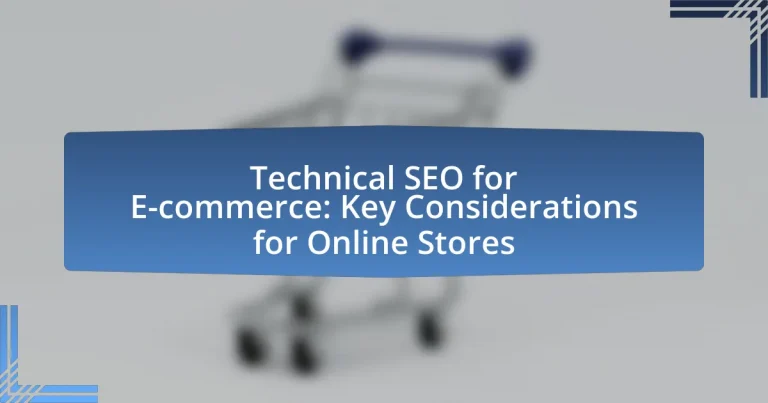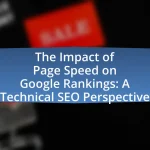Technical SEO for E-commerce involves optimizing a website’s infrastructure to improve its visibility and performance in search engine results. This article outlines the differences between technical and traditional SEO, highlighting unique challenges faced by e-commerce sites, such as managing duplicate content and ensuring site speed. Key components of effective technical SEO include site speed optimization, mobile-friendliness, structured data implementation, and secure connections. The article also discusses common technical issues, best practices for optimizing product pages, and the importance of regular audits to enhance website performance. Emerging trends, including the impact of AI and machine learning on SEO strategies, are also examined, providing a comprehensive overview of essential considerations for online stores.
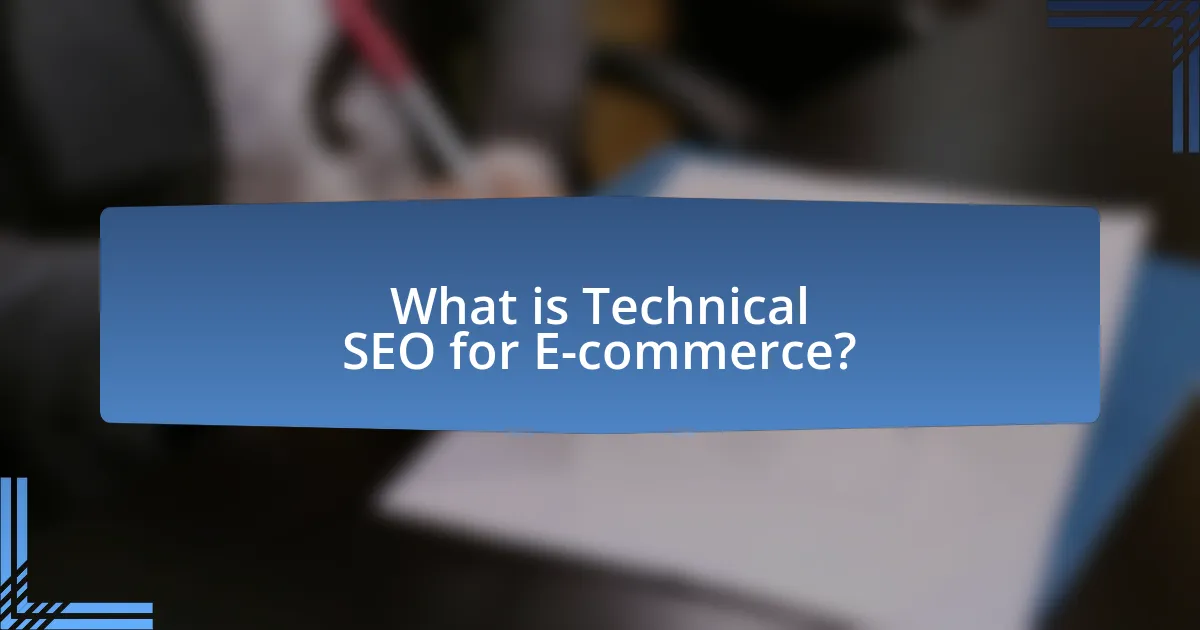
What is Technical SEO for E-commerce?
Technical SEO for E-commerce refers to the optimization of a website’s infrastructure to enhance its visibility and performance in search engine results. This includes ensuring proper indexing, improving site speed, optimizing mobile responsiveness, and implementing structured data to facilitate better search engine understanding of product information. For instance, a study by Google indicates that 53% of mobile users abandon sites that take longer than three seconds to load, highlighting the importance of site speed in technical SEO.
How does Technical SEO differ from traditional SEO?
Technical SEO focuses on optimizing the infrastructure and backend of a website to improve its crawling and indexing by search engines, while traditional SEO emphasizes content creation and keyword optimization to enhance visibility and rankings. Technical SEO includes elements such as site speed, mobile-friendliness, structured data, and secure connections, which are crucial for search engines to effectively access and understand a site. In contrast, traditional SEO primarily deals with on-page factors like content quality, keyword usage, and link building. The distinction is significant because a well-optimized technical foundation can enhance the effectiveness of traditional SEO efforts, leading to better overall search performance.
What are the unique challenges faced by e-commerce websites in Technical SEO?
E-commerce websites face unique challenges in Technical SEO primarily due to their complex structures and large volumes of products. These challenges include managing duplicate content, as multiple product variations can lead to similar pages being indexed, which dilutes search visibility. Additionally, e-commerce sites often struggle with site speed optimization, as heavy images and scripts can slow down loading times, negatively impacting user experience and search rankings.
Another significant challenge is the implementation of structured data, which is crucial for enhancing search visibility through rich snippets. E-commerce sites must ensure that product information is correctly marked up to improve click-through rates. Furthermore, the need for effective URL structures is critical; e-commerce websites must create clean, descriptive URLs that are easy for search engines to crawl and understand.
Lastly, maintaining a robust internal linking strategy is essential for guiding users and search engines through the site, but this can be complicated by the sheer number of pages and products. These challenges highlight the necessity for e-commerce websites to adopt a comprehensive Technical SEO strategy tailored to their specific needs.
Why is Technical SEO crucial for online stores?
Technical SEO is crucial for online stores because it directly impacts their visibility and performance in search engine results. Effective technical SEO ensures that search engines can crawl, index, and understand the website’s content, which is essential for ranking higher in search results. For instance, according to a study by Moz, over 70% of search engine users do not click past the first page of results, highlighting the importance of being visible. Additionally, technical SEO practices such as optimizing site speed, mobile-friendliness, and structured data can enhance user experience, leading to higher conversion rates. Research from Google indicates that a one-second delay in page load time can lead to a 20% drop in conversion rates, underscoring the necessity of technical SEO for maximizing sales potential in online stores.
What are the key components of Technical SEO for E-commerce?
The key components of Technical SEO for E-commerce include site speed optimization, mobile-friendliness, structured data implementation, secure connections (HTTPS), and proper URL structure. Site speed optimization is crucial as 47% of consumers expect a webpage to load in two seconds or less, and a delay of just one second can reduce conversions by 7%. Mobile-friendliness is essential since over 50% of global web traffic comes from mobile devices, necessitating responsive design. Structured data helps search engines understand product information better, enhancing visibility in search results. Secure connections (HTTPS) are vital for protecting user data and improving trust, with Google favoring secure sites in rankings. Lastly, a clean and logical URL structure aids both users and search engines in navigating the site effectively, contributing to better indexing and user experience.
How does website speed impact e-commerce SEO?
Website speed significantly impacts e-commerce SEO by influencing user experience and search engine rankings. Faster websites lead to lower bounce rates, as users are less likely to abandon a site that loads quickly. According to Google, a one-second delay in mobile page load time can reduce conversions by up to 20%. Additionally, search engines like Google consider page speed as a ranking factor, meaning that slower websites may rank lower in search results, reducing visibility and traffic. Therefore, optimizing website speed is crucial for improving both user engagement and search engine performance in e-commerce.
What role does mobile optimization play in Technical SEO?
Mobile optimization is crucial in Technical SEO as it directly impacts search engine rankings and user experience. With over 50% of global web traffic coming from mobile devices, search engines like Google prioritize mobile-friendly websites in their algorithms. This prioritization is evident in Google’s mobile-first indexing approach, which means that the mobile version of a site is considered the primary version for ranking purposes. Additionally, a well-optimized mobile site enhances loading speed and usability, reducing bounce rates and increasing engagement, which are key factors in SEO performance.
What are common Technical SEO issues in e-commerce?
Common technical SEO issues in e-commerce include slow page load times, poor mobile optimization, duplicate content, broken links, and improper use of canonical tags. Slow page load times can negatively impact user experience and search rankings; for instance, Google states that a one-second delay can reduce conversions by 7%. Poor mobile optimization affects accessibility, as over 50% of e-commerce traffic comes from mobile devices. Duplicate content can confuse search engines, leading to lower rankings, while broken links can hinder site navigation and user experience. Lastly, improper use of canonical tags can result in indexing issues, preventing search engines from recognizing the preferred version of a page.
How can duplicate content affect an online store’s SEO?
Duplicate content can significantly harm an online store’s SEO by causing search engines to struggle with determining which version of the content to index and rank. This confusion can lead to lower visibility in search results, as search engines may choose to rank only one version, potentially excluding others that could drive traffic. According to a study by Moz, duplicate content can dilute link equity, meaning that backlinks may be spread across multiple versions rather than concentrated on a single authoritative page. This dilution can result in lower overall rankings and reduced organic traffic for the online store.
What are the implications of poor site architecture on e-commerce SEO?
Poor site architecture negatively impacts e-commerce SEO by hindering search engine crawlers’ ability to index pages effectively. When a website has a disorganized structure, it can lead to issues such as slow loading times, increased bounce rates, and difficulty in navigating for users, which ultimately affects user experience and conversion rates. According to a study by Google, 53% of mobile users abandon sites that take longer than three seconds to load, highlighting the importance of efficient site architecture in retaining visitors. Additionally, a poorly structured site may result in lower rankings in search engine results pages (SERPs) due to inadequate internal linking and content discoverability, which are critical factors for SEO success.
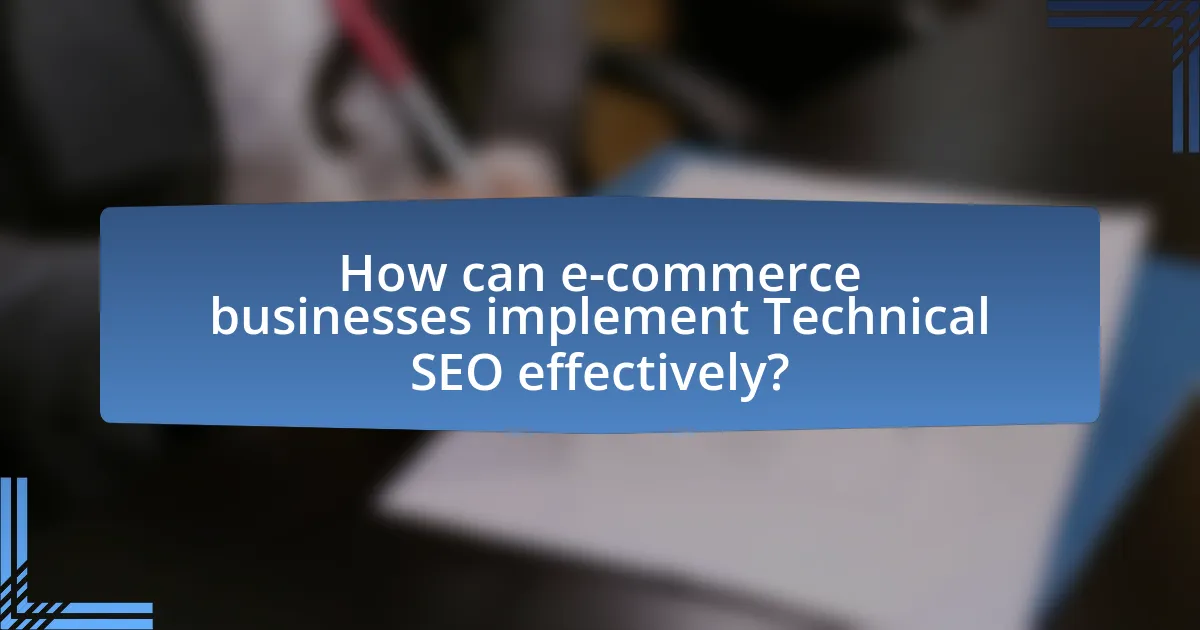
How can e-commerce businesses implement Technical SEO effectively?
E-commerce businesses can implement Technical SEO effectively by optimizing website structure, improving site speed, ensuring mobile-friendliness, and utilizing structured data. A well-organized website structure enhances user experience and helps search engines crawl and index pages efficiently. According to Google, a site that loads in under three seconds has a significantly lower bounce rate, which can improve rankings. Mobile-friendliness is crucial, as over 50% of global web traffic comes from mobile devices, making responsive design essential. Additionally, using structured data, such as schema markup, allows search engines to better understand product information, which can lead to rich snippets in search results, increasing visibility and click-through rates.
What tools are available for auditing Technical SEO?
Tools available for auditing Technical SEO include Google Search Console, Screaming Frog SEO Spider, Ahrefs, SEMrush, and Moz Pro. Google Search Console provides insights into website performance and indexing issues, while Screaming Frog SEO Spider allows for in-depth site crawling to identify technical issues like broken links and duplicate content. Ahrefs and SEMrush offer comprehensive site audits that analyze various SEO factors, including site speed and mobile usability. Moz Pro includes tools for tracking site health and identifying technical SEO problems. These tools are widely recognized in the industry for their effectiveness in identifying and resolving technical SEO issues.
How can Google Search Console assist in Technical SEO for e-commerce?
Google Search Console assists in Technical SEO for e-commerce by providing critical insights into website performance, indexing status, and search visibility. It enables e-commerce sites to monitor and resolve issues such as crawl errors, which can hinder product pages from being indexed. Additionally, it offers data on search queries that lead users to the site, allowing for optimization of product descriptions and metadata to improve rankings. The tool also provides alerts for mobile usability issues, ensuring that e-commerce sites are accessible on all devices, which is essential for user experience and conversion rates. Furthermore, Google Search Console allows for the submission of sitemaps, facilitating better indexing of product pages, and supports structured data testing, which enhances rich snippets in search results, ultimately driving more traffic to e-commerce platforms.
What are the benefits of using SEO plugins for e-commerce platforms?
SEO plugins for e-commerce platforms enhance online visibility and drive traffic by optimizing website content for search engines. These plugins streamline keyword management, improve meta tags, and facilitate structured data implementation, which are crucial for better search rankings. For instance, a study by HubSpot found that businesses using SEO tools saw a 14.6% increase in organic traffic compared to those that did not utilize such tools. Additionally, SEO plugins often provide analytics and performance tracking, enabling e-commerce businesses to make data-driven decisions that further enhance their online presence.
What best practices should be followed for Technical SEO in e-commerce?
Best practices for Technical SEO in e-commerce include optimizing site speed, ensuring mobile-friendliness, implementing structured data, creating an XML sitemap, and managing URL structures effectively. Site speed is crucial as Google considers it a ranking factor; for instance, a one-second delay in page load time can lead to a 7% reduction in conversions. Mobile-friendliness is essential since over 50% of e-commerce traffic comes from mobile devices, necessitating responsive design. Structured data helps search engines understand product information, enhancing visibility in search results. An XML sitemap facilitates better indexing by search engines, while clean URL structures improve user experience and SEO performance.
How can structured data enhance e-commerce SEO?
Structured data enhances e-commerce SEO by providing search engines with clear, organized information about products, which improves visibility in search results. This structured format allows search engines to understand product details such as price, availability, and reviews, leading to rich snippets that can increase click-through rates. According to a study by Search Engine Land, websites utilizing structured data can see a 30% increase in organic traffic due to improved search result presentation.
What are the best practices for optimizing product pages?
The best practices for optimizing product pages include using high-quality images, writing unique and detailed product descriptions, optimizing title tags and meta descriptions, implementing structured data, and ensuring mobile-friendliness. High-quality images enhance user experience and can increase conversion rates, as studies show that 67% of consumers consider image quality very important in their purchasing decisions. Unique and detailed product descriptions improve search engine visibility and help differentiate products, which is crucial since 70% of consumers prefer to read a description before making a purchase. Optimizing title tags and meta descriptions improves click-through rates; for instance, a well-crafted title can increase organic traffic by up to 36%. Implementing structured data helps search engines understand product information better, which can lead to rich snippets in search results, enhancing visibility. Lastly, ensuring mobile-friendliness is critical, as mobile devices account for over 50% of e-commerce traffic, and Google prioritizes mobile-optimized sites in its rankings.
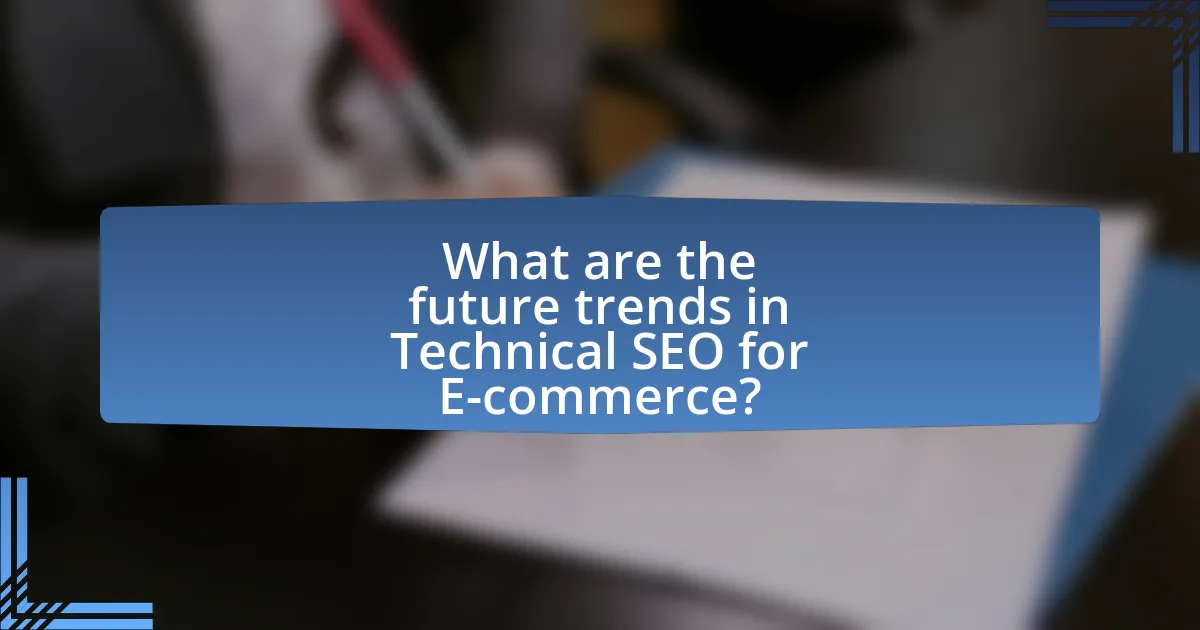
What are the future trends in Technical SEO for E-commerce?
Future trends in Technical SEO for E-commerce include the increased focus on mobile-first indexing, enhanced site speed optimization, and the integration of artificial intelligence for personalized user experiences. Mobile-first indexing is essential as Google prioritizes mobile versions of websites for ranking, reflecting the growing number of mobile shoppers. Site speed optimization remains critical, with studies indicating that a one-second delay in page load time can lead to a 7% reduction in conversions. Additionally, the use of AI in SEO strategies allows for more tailored content and product recommendations, improving customer engagement and conversion rates. These trends are shaping the future landscape of E-commerce SEO, emphasizing the need for businesses to adapt to technological advancements and consumer behavior shifts.
How will AI and machine learning impact Technical SEO strategies?
AI and machine learning will significantly enhance Technical SEO strategies by enabling more sophisticated data analysis and automation. These technologies can analyze vast amounts of data to identify patterns and trends that inform SEO decisions, such as optimizing site speed, improving mobile responsiveness, and enhancing user experience. For instance, Google’s RankBrain, an AI component of its search algorithm, uses machine learning to better understand user queries and deliver more relevant search results, which directly influences how websites should be optimized for visibility. Additionally, AI tools can automate repetitive tasks like keyword research and site audits, allowing SEO professionals to focus on strategic initiatives. This shift towards data-driven decision-making and automation is supported by industry reports indicating that companies leveraging AI in their SEO efforts see improved rankings and increased organic traffic.
What emerging technologies should e-commerce businesses be aware of?
E-commerce businesses should be aware of artificial intelligence (AI), augmented reality (AR), blockchain technology, and voice commerce. AI enhances customer experience through personalized recommendations and chatbots, with 80% of businesses expected to use chatbots by 2025, according to a report by Business Insider. AR allows customers to visualize products in their environment, increasing engagement and reducing return rates; for instance, IKEA’s AR app has shown a significant increase in customer satisfaction. Blockchain technology improves supply chain transparency and security, with 57% of executives believing it will be a critical factor in their operations by 2025, as reported by Deloitte. Voice commerce is rapidly growing, with estimates suggesting that 55% of households will own a smart speaker by 2022, according to a report by OC&C Strategy Consultants. These technologies are reshaping the e-commerce landscape, making them essential for businesses to adopt.
What practical tips can improve Technical SEO for online stores?
To improve Technical SEO for online stores, focus on optimizing site speed, ensuring mobile-friendliness, and implementing structured data. Site speed is crucial as Google considers it a ranking factor; a faster site enhances user experience and can lead to higher conversion rates. Mobile-friendliness is essential since over 50% of global web traffic comes from mobile devices, making responsive design a necessity. Implementing structured data helps search engines understand your content better, which can enhance visibility in search results. According to Google, using structured data can lead to rich snippets, improving click-through rates.
How can regular audits enhance e-commerce website performance?
Regular audits can significantly enhance e-commerce website performance by identifying and resolving technical issues that hinder user experience and search engine visibility. These audits assess various aspects such as site speed, mobile responsiveness, and broken links, which are critical for maintaining optimal functionality. For instance, a study by Google indicates that a one-second delay in page load time can lead to a 20% decrease in conversion rates. By regularly conducting audits, e-commerce sites can ensure compliance with SEO best practices, improve site architecture, and enhance overall user engagement, ultimately leading to increased traffic and sales.
What are the most effective ways to stay updated on Technical SEO trends?
The most effective ways to stay updated on Technical SEO trends include following industry-leading blogs, participating in webinars, and engaging with SEO communities on social media platforms. Industry-leading blogs such as Moz, Search Engine Journal, and Ahrefs regularly publish articles and updates on the latest trends and algorithm changes, providing valuable insights. Webinars hosted by SEO experts offer real-time information and practical advice on emerging trends. Additionally, engaging with SEO communities on platforms like Twitter and LinkedIn allows professionals to share knowledge and discuss recent developments, ensuring that one remains informed about the latest Technical SEO practices.
